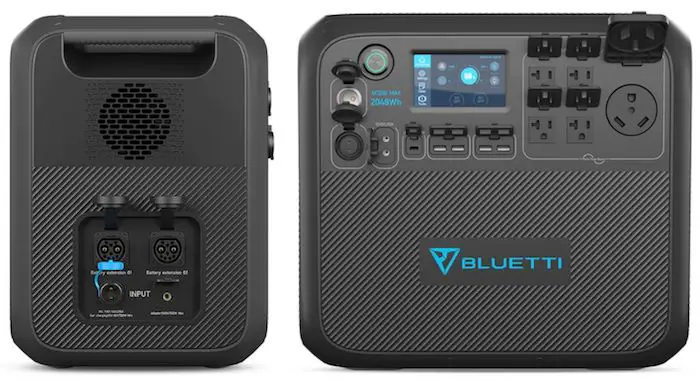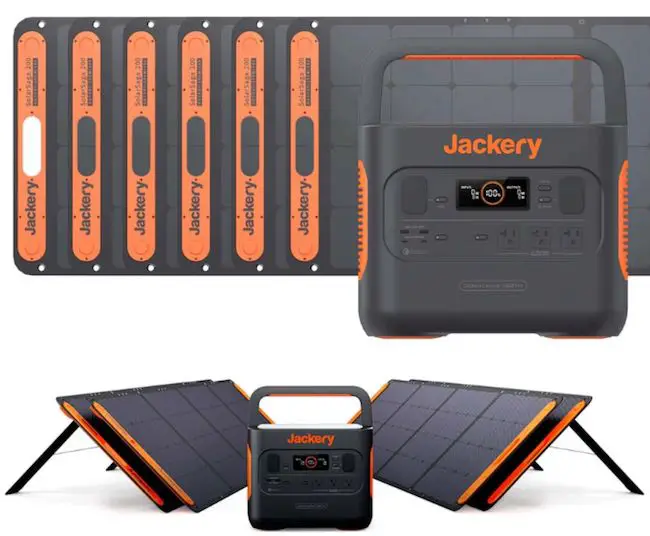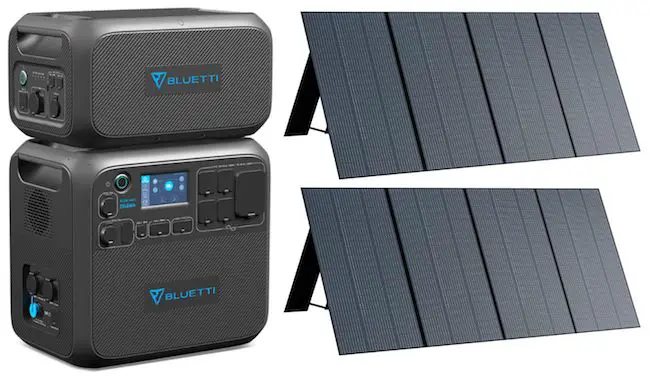In this comparison of portable power stations, I took similar models from Bluetti and Jackery and compared them directly.
I then added up their pros and cons and picked a winner for each comparison.
Overall, Bluetti has a better power station selection than Jackery due to longer-lasting batteries, more port options, and faster recharging times. However, Jackery’s power stations are lighter and therefore more portable.
Here are my comparisons, results, and why:
| Portable Power Stations Compared | Winner | What Makes It Better? | Check Price |
|---|---|---|---|
| Bluetti EB3A vs. Jackery Explorer 300 | Bluetti EB3A | 1. Pairs with smartphone 2. Faster recharging 3. More powerful AC ports | EB3A 1. Bluetti's website |
| Bluetti EB55 vs. Jackery Explorer 500 | Bluetti EB55 | 1. Faster recharging 2. Longer-lasting battery 3. More powerful AC ports | EB55 1. Amazon 2. Bluetti's website 3. Shop Solar Kits |
| Bluetti EB70S vs. Jackery Explorer 1000 | Bluetti EB70S | 1. Significantly less expensive 2. More port options 3. Longer-lasting battery | EB70S 1. Amazon 2. Bluetti's website 3. Shop Solar Kits |
| Bluetti AC200MAX vs. Jackery Explorer 2000 Pro | Bluetti AC200MAX | 1. Eight more output ports 2. Can add expansion batteries 3. Battery lasts 3.5x longer | AC200MAX 1. Amazon 2. Shop Solar Kits 3. Bluetti's website |
Table of contents
Bluetti vs. Jackery Solar Generators – Key Differences
The following conclusions are based on the four models from each company that I compared in this post.
Conclusion #1 – Bluetti Models Have More Output Ports
- Of the four systems compared, Bluetti power stations average an additional five output ports compared to Jackery’s.
- The biggest difference in port options came from the Bluetti AC200MAX versus the Jackery Explorer 2000 Pro (16 vs. 8 output ports).
Conclusion #2 – Jackery’s Power Stations Are Lighter Than Bluetti’s
- Jackery power stations weigh on average 28% less than Bluetti models when battery capacity is equaled out.
- The most significant weight difference comes from the largest models compared. The Jackery 2000 Pro weighs nearly 20 lbs less than the Bluetti AC200MAX while also housing a larger battery.
Conclusion #3 – Bluetti Has Faster Recharging Speeds Than Jackery
- Bluetti models recharge an average of 40% faster from wall charging and 77% faster from solar charging over Jackery.
- The above percentages would be much higher if the Jackery 2000 Pro was not included in this comparison. This is because the 2000 Pro charges 2.75x faster from wall charging and 1.2x faster via solar panel charging versus the Bluetti AC200MAX.
Conclusion #4 – Bluetti’s Batteries Last Significantly Longer
- Bluetti solar generators average a 4.4x longer battery life (to 80% capacity) over Jackery models.
- This is because Bluetti uses LiFePO4 batteries for their products while Jackery uses lithium-ion batteries.
Let’s begin our comparisons with the smallest matchup between the two brands.
Bluetti EB3A vs. Jackery Explorer 300
The Bluetti EB3A is better than the Jackery Explorer 300 because it recharges faster, has higher powered AC outputs, can be connected to your phone via the Bluetti app, and its battery lasts five times longer. However, the Jackery 300 is more portable than the EB3A.
| Model | Jackery Explorer 300 | Bluetti EB3A |
|---|---|---|
| Pros | 1. Updated ports 2. Lightweight 3. 4 charging options | 1. Mobile app 2. Fast recharging 3. High-powered AC ports |
| Cons | 1. Doesn’t stand out compared to similar-sized models | 1. Heavier than similar-sized models |
Overview of the Jackery Explorer 300
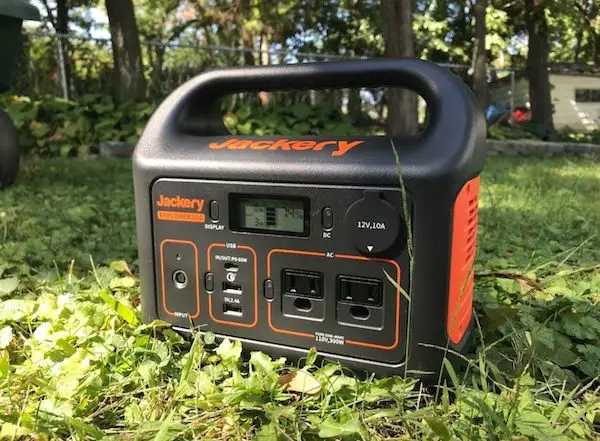
The Jackery Explorer 300 is the updated version of the Explorer 240 model. It has additional port options and a bigger battery.
Its dimensions are small enough to fit in a standard backpack, and its seven-pound weight is very light compared to similar models.
As with nearly all Jackery portable power stations, the Explorer 300 is easy to use. Its ports are laid out for you on its front side along with its backlit LCD screen.
The LCD screen shows input wattage, output wattage, as well as battery status.
Jackery Explorer 300: What Does It Come With?

The Explorer 300 comes with the following:
- AC adapter
- Car charger cable
- Cable pouch
- User manual
- 2-year warranty
Overview of the Bluetti EB3A
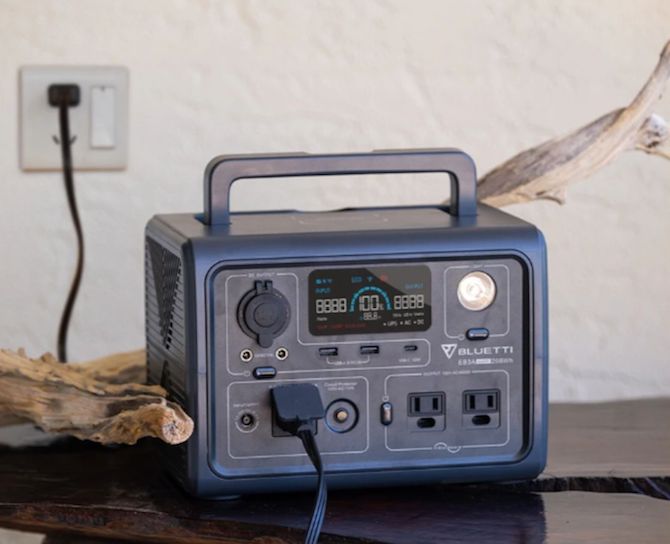
Bluetti’s EB3A is the smallest portable power station from the company with a battery capacity of 268Wh.
Bluetti is most known for their larger solar generators, but they’ve recently produced multiple models under 1,000Wh. These include the EB55, EB70, EB70S, and, of course, the EB3A.
The power station that is most similar to the EB3A is the EcoFlow River. This is because they both have:
- Similar power outputs from their AC ports
- Mobile applications
- Similar battery sizes
- Similar recharging times
A major benefit of the EB3A is its battery cycle life, which is rated for 2,500 cycles to 80% capacity. This means that it will last much longer than its competitors, which tend to be rated for 500 cycles.
Bluetti EB3A: What Does It Come With?
- AC charging cable
- 2-year warranty
- User manual
Some other optional accessories that you can get with it include a car charging cable, solar charging cable, and USB-C to USB-C cable.
Specs & Features of the Jackery 300 & Bluetti EB3A
Below, I’ve compared the stats and laid them out so you can get a good idea of the similarities and differences of each power station.
| Solar Generator | Bluetti EB3A | Jackery Explorer 300 |
|---|---|---|
| Image | 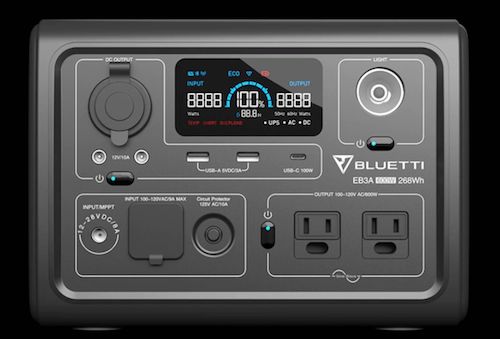 | |
| Battery Capacity | 268.8Wh | 293Wh |
| Dimensions | 10 x 7.1 x 7.2 in | 9.1 x 5.2 x 7.8 in |
| Output Ports | 2x AC ports: 600W (1,200W peak) 1x DC car port (12V, 10A) 2x DC5521 ports (12V, 10A) 1x USB-C port (100W max) 2x USB-A ports (15W max) 1x Wireless charging pad (15W max) | 2x AC ports: 300W (500W peak) 1x DC car port (12V, 10A) 1x USB-C PD port (60W max) 1x USB-A Quick Charge 3.0 port (18W max) 1x Standard USB-A port (12W max) |
| Charge Times* | AC Wall Charging Turbo mode (350W): 1.3-1.8 hrs Standard mode (268W): 1.5-2 hrs Solar Charging @ max input (200W): 1.8-2 hrs Car Charging @ 12V (100W): 3.2-3.7 hrs @ 24V (200W): 1.9-2.4 hrs Combined Charging AC + Solar (430W): 1.2-1.7 hrs Dual AC (430W): 1.2-1.7 hrs | AC Wall Charging Standard (90W): 4.5-5 hrs Solar Charging @ max input (90W): 4.5-5 hrs Car Charging @ 12V (82W): 4.5-5 hrs USB-C PD Charging @ 60W max: 5.5 hrs Combined Charging USB-C + AC (150W): 2.5 hrs |
| Weight | 10.14 lbs | 7.1 lbs |
| Cycle Life | 2,500 cycles to 80% capacity | 500 cycles to 80% capacity |
| Warranty | 24 months | 24 months |
| Price | $299 (Bluetti's website) | $299 (Amazon) |
| User Manual | EB3A manual | Jackery 300 manual |
*Charge Times: The listed solar input and recharging time is based on the maximum solar input - not the solar panel rated power output (Ex: a 100W solar panel usually produces about 80W of actual power in good sunlight).
Some of the biggest differences between these two power stations can be found in their output ports, recharging times, batteries, and size/weight.
- Output Ports: The EB3A has AC ports that are twice as powerful as the Explorer 300. The EB3A also has three more outputs than the Explorer, including a wireless charging pad and two DC5521 ports.
- Charging Times: For all three methods of charging, the Bluetti EB3A recharges faster than the Explorer 300. This is especially seen with AC charging (3.5x faster) and solar charging (2.5x faster).
- Batteries: The EB3A uses a LiFePO4 battery and the Jackery 300 uses a lithium-ion battery. Basically, Bluetti’s battery type allows the power station to last much longer (5x longer) than the Jackery model.
- Size/Weight: With my own Jackery 300, I can fit it into my backpack with no problem. Plus it only weighs 7 lbs, which makes it easy to carry. As for the EB3A, it is 10 lbs and has a larger volume, which makes it less portable.
Similar: 6 Best LiFePO4 Solar Generators (Stats, Pricing, and Analysis)
Bluetti EB3A vs. Explorer 300 – What Can They Power?
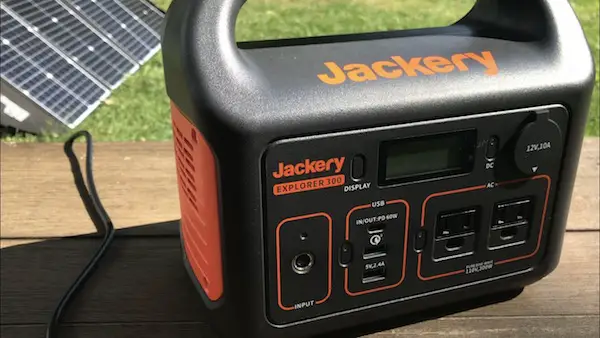
| Power Station/Appliance | Bluetti EB3A | Jackery Explorer 300 |
|---|---|---|
| Laptop (80Wh) | 2-3 charges | 2.5-3 charges |
| LCD TV (150W) | 1.3 hours | 1.5 hours |
| Tablet (30Wh) | 7-8 charges | 7-9 charges |
| Smartphone (8Wh) | 25-30 charges | 27-33 charges |
| CPAP Machine (40W) | 5-6 hours | 5.5-6.5 hours |
| Desktop Computer (200W) | 1 hour | 1 hour |
| Blender (250W) | 48 minutes | 53 minutes |
| Portable Refrigerator (70W) | 3+ hours | 3+ hours |
Which Is Better Overall – The Jackery Explorer 300 or Bluetti EB3A?
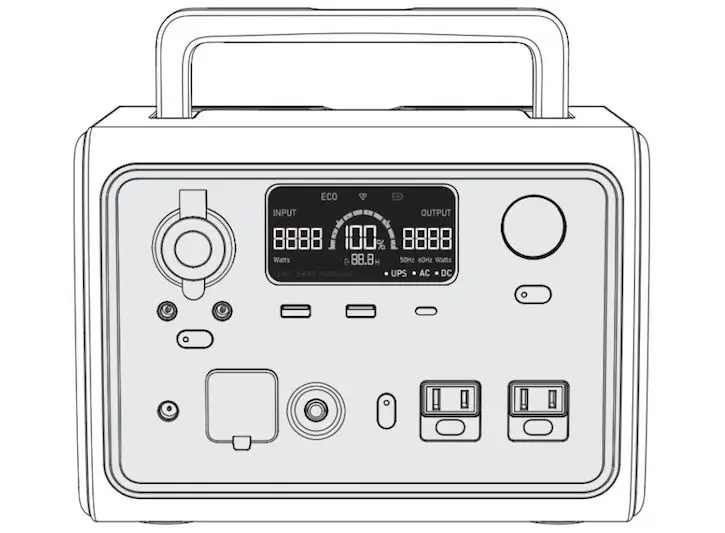
The Bluetti EB3A is better for most people because you can use it with more appliances, use it more often, and get more use out of it than the Jackery 300.
| Generator | Jackery Explorer 300 | Bluetti EB3A |
|---|---|---|
| Highest Battery Capacity | X | |
| Most Port Options | X | |
| Highest-Powered AC Ports | X | |
| Fastest Charging Methods | X | |
| Highest Solar Input | X | |
| Most Portable | X | |
| Lightest Weight | X | |
| Mobile App | X |
If portability is crucial for your power station, then I’d definitely go for the Jackery 300. However, the EB3A is a much better model for nearly all other criteria. You can find the Bluetti EB3A here on Bluetti’s website (affiliate link).
If you’d like to dive deeper into the Explorer 300, I recommend reading my individual review on it here: Jackery Explorer 300 Review (Comparison & Analysis).
Bluetti EB55 vs. Jackery Explorer 500
The Bluetti EB55 is better than the Jackery Explorer 500 because it has more output ports, a higher AC output, faster recharging times, and a longer lasting battery.
| Model | Bluetti EB55 | Jackery Explorer 500 |
|---|---|---|
| Pros | 1. Long battery cycle life 2. High-powered AC ports 3. Several output ports (13) | 1. Lightweight (13.3 lbs) 2. Easy to use |
| Cons | 1. Battery percentage only shown in 20% increments 2. Relatively heavy (16.5 lbs) | 1. No USB-C ports 2. Only one AC port |
Bluetti EB55 Overview
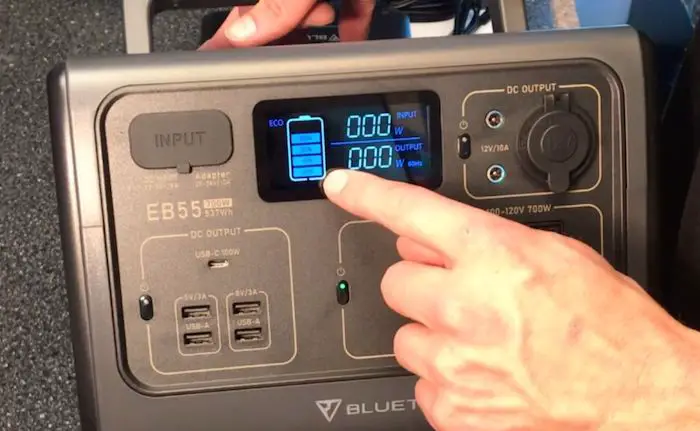
Still on the smaller side of Bluetti’s models is the EB55, which has a 537Wh battery and several available output ports. It’s a straightforward system for the most part. It’s powerful with a 700W max continuous AC output and 100W USB port, plus it recharges fast from the wall and from solar panels.
There is no mobile app for this power station, which would be a nice touch, but it isn’t necessary.
After reviewing this system and testing it out, I can say that this model simply gets the job done. It isn’t fancy, but it’s functional and performs well for its size.
What Does the EB55 Come With?
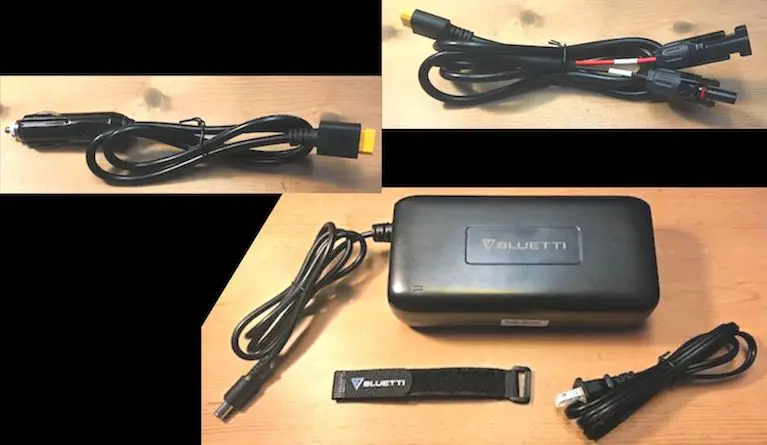
The EB55 comes with the following accessories:
- AC adapter & charging cable
- Car charging cable (XT60-F)
- Solar charging cable (MC4 to XT60-F)
- User manual
- Warranty card
Overview of the Jackery Explorer 500
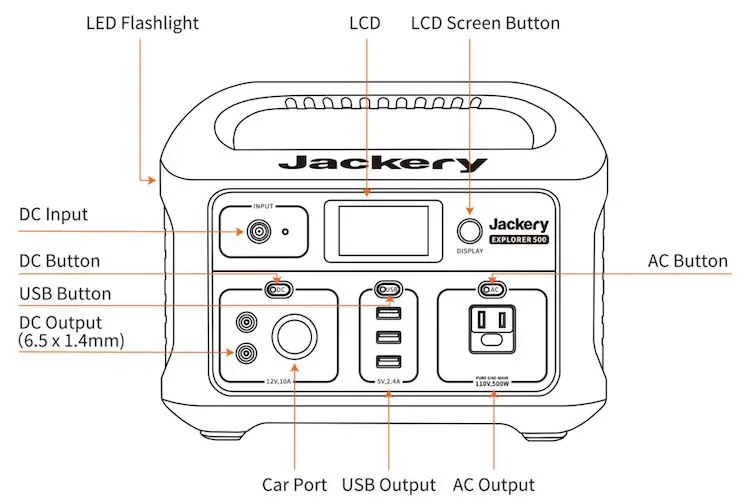
This 518Wh power station is extremely simple and easy to use. It’s made for people who don’t necessarily need or want any extra features that can sometimes overcomplicate things.
All of its input and output ports are located on its front side, with the input on the upper left side for Jackery solar panels, wall chargers, and car chargers.
The Explorer 500 has been on the market for several years and it continues to get positive ratings because it simply works to specification.
Due to its age, this system doesn’t have any updated ports like USB-Cs or wireless charging pads. However, it can still be used for charging most devices with ease.
Jackery Explorer 500: What Does It Come With?
- Explorer 500 power station
- AC adapter
- Car charger cable
- User manual
- 2-year warranty
Specs & Features – Jackery 500 vs. Bluetti EB55
| Solar Generator | Bluetti EB55 | Jackery Explorer 500 |
|---|---|---|
| Image | 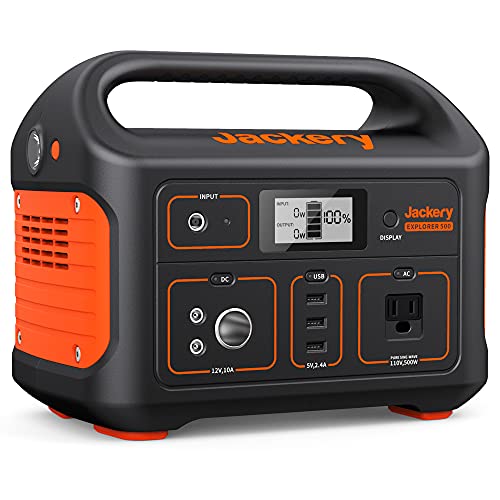 |
|
| Battery Capacity | 537Wh | 518Wh |
| Dimensions | 10.9 x 7.9 x 7.8 in | 11.8 x 7.6 x 9.5 in |
| Output Ports | 4x AC ports: 700W (1,400W peak) 1x DC car port (12V, 10A) 2x DC5521 ports (12V, 10A) 1x USB-C port (100W max) 4x USB-A ports (15W max) 1x Wireless charging pad (15W max) | 1x AC port: 500W (1,000W peak) 1x DC car port (12V, 10A) 2x DC 6.5x1.4mm ports (12V, 7A) 3x USB-A ports (12W max) |
| Charge Times* | AC Wall Charging Standard (200W): 2.7-3.2 hrs Solar Charging @ max input (200W): 2.7-3.2 hrs Car Charging @ 12V (100W): 6 hrs @ 24V (200W): 3 hrs Combined Charging AC + Solar (400W): 1.8-2.3 hrs Dual AC (400W): 1.8-2.3 hrs | AC Wall Charging Standard (90W): 7-7.5 hrs Solar Charging @ max input (90W): 7-7.5 hrs Car Charging @ 12V (82W): 7.5-8 hrs |
| Weight | 16.5 lbs | 13.32 lbs |
| Cycle Life | 2,500 cycles to 80% capacity | 500 cycles to 80% capacity |
| Warranty | 24 months | 24 months |
| Price | $500 (Amazon) | $529 (Amazon) |
| User Manual | EB55 manual | Jackery 500 manual |
*Charge Times: The listed solar input and recharging time is based on the maximum solar input - not the solar panel rated power output (Ex: a 100W solar panel usually produces about 80W of actual power in good sunlight).
Breaking down the core differences in these models, there are two sections that stand out the most along with two areas that should be covered.
The main areas to discuss are their output ports and charging times. The secondary areas regard weight differences and battery longevity.
- Output Ports: The EB55 model came out years after the Jackery 500, so the port options are vastly different. There are 13 outputs on the Bluetti, whereas the Jackery only has seven. The EB55’s AC ports are more powerful and its USB selection is better because it has a USB-C output and four USB-As. The Explorer 500 only has three standard USB-As.
- Charging Times: Both solar and wall charging are over 2.5x faster in the EB55. This plays a significant role for you if you intend to use the system often.
- Weight: The Jackery 500 is over three pounds lighter than the EB55. This is important if you need the most portability possible, but otherwise, it is not a crucial specification since both systems are around 15 lbs.
- Battery Cycle Life: Often overlooked, the LiFePO4 battery in the Bluetti EB55 is rated to last over 5x longer than the Jackery 500. If you want the most value from your power station long-term, this needs to be considered.
What Can They Power?
| Power Station/Appliance | Bluetti EB55 | Jackery Explorer 500 |
|---|---|---|
| Laptop (80Wh) | 5-6 charges | 5-6 charges |
| LCD TV (150W) | 2.74 hours | 2.59 hours |
| Tablet (30Wh) | 13-16 charges | 13-15 charges |
| Smartphone (8Wh) | 51-60 charges | 48-58 charges |
| Desktop Computer (200W) | 2 hours | 2 hours |
| Microwave Oven (1100W) | 22 minutes | N/A |
| Blender (250W) | 1.64 hours | 1.55 hours |
| Toaster (650W) | 38 minutes | N/A |
| Portable Refrigerator (70W) | 6-7+ hours | 5.5-7+ hours |
Which Is Better Overall?
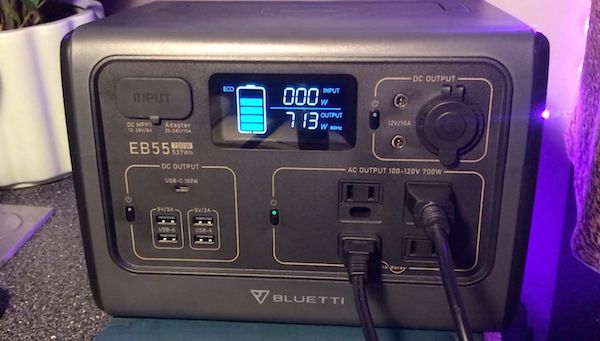
The EB55 is the best power station of the two because it has more options for charging and powering devices and appliances. It also lasts much longer than the Explorer 500, which makes it more reliable for years to come.
| Generator | Bluetti EB55 | Jackery Explorer 500 |
|---|---|---|
| Higher Battery Cycle Life | X | |
| More Port Options | X | |
| Higher-Powered AC Ports | X | |
| Higher Solar Input | X | |
| Faster AC Charging | X | |
| Better LCD Screen | X | |
| Lighter Weight | X | |
| Cheaper Cost | X |
You can find out more of my experiences with the EB55 here in my review post: Test & Review: Bluetti EB55 Solar Generator (In-Depth). Or, you can get the EB55 below:
If you prefer simplicity over the stats, the Explorer 500 may be the ideal choice. For more information on the smaller Jackery models, check out my comparison post here: Jackery Explorer 300 vs 500 – Overview & Analysis.
Bluetti EB70S vs. Jackery Explorer 1000
The Bluetti EB70S is better than the Jackery Explorer 1000 because its long-lasting LiFePO4 battery, fast recharging times, and output options. The EB70S has more output ports than the Jackery 1000 for all three sections (AC, 12V, and USB).
| Model | Bluetti EB70S | Jackery Explorer 1000 |
|---|---|---|
| Pros | 1. High AC output 2. Long-lasting battery 3. 12 total outputs | 1. Lightweight 2. Powerful AC ports 3. Large battery |
| Cons | 1. LCD screen only measures in 20% increments 2. Uses same AC charger as smaller EB55 | 1. Expensive 2. Slow recharging speeds |
Bluetti EB70S Overview
Although it has very similar features to the smaller EB55, the EB70S has a slightly more powerful AC output and an additional USB-C port for fast charging. In addition to this is its larger battery (716Wh) that can bring some additional charging time to your devices when needed.
The most striking aspect of this model is its price in relation to the EB55. It’s $70-100 more than its smaller brother, which is not a lot of additional cost for the added value this system brings.
One thing to be aware of is its weight (21.4 lbs). It’s not the easiest thing to carry around, but it can be easily moved short distances if needed.
EB70S – What Does It Come With?
- AC adapter & charging cable
- Car charging cable
- Solar charging cable
- User manual
- Warranty card
- Certificate of QC pass
Overview of the Jackery Explorer 1000
The Explorer 1000 was the largest solar generator offered by Jackery for quite some time before they launched the Explorer 1500 and 2000.
With its 1,000W pure sine wave inverter, the AC ports on this portable system can power a fridge, blender, and other demanding appliances with ease. Using its DC car port output, its 1,002Wh battery can power portable fridges and CPAP machines for extended periods.
It’s the largest model to have the same design as the smaller options. While the larger Jackerys have updated LCD displays and faster recharging capabilities, this system keeps its simplicity intact from its LCD screen all the way to its output port layout.
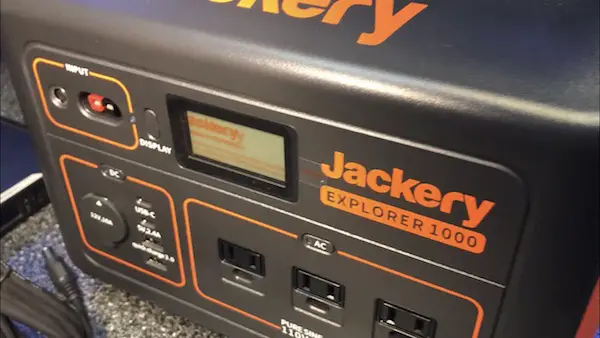
It features an LED light on its side and it also has an Anderson Powerpole input for used with either Jackery’s own solar panels or third-party options.
Jackery Explorer 1000: What Does It Come With?
- AC adapter
- SolarSaga parallel adapter cable
- Car charger cable
- User manual
- 2-year warranty
Specs & Features of the Jackery 1000 & Bluetti EB70S
| Solar Generator | Bluetti EB70S | Jackery Explorer 1000 |
|---|---|---|
| Image | ||
| Battery Capacity | 716Wh | 1,002Wh |
| Dimensions | 12.6 x 8.5 x 8.7 in | 13.1 x 9.2 x 11.1 in |
| Output Ports | 4x AC ports: 800W (1,400W peak) 1x DC car port (12V, 10A) 2x DC5521 ports (12V, 10A) 2x USB-C ports (100W max) 2x USB-A ports (15W max) 1x Wireless charging pad (15W max) | 3x AC ports: 1,000W (2,000W peak) 1x DC car port (12V, 10A) 1x USB-C port (18W max) 1x USB-A QC 3.0 port (18W max) 1x USB-A port (12W max) |
| Charge Times* | AC Wall Charging Standard (200W): 4-4.5 hrs Solar Charging @ max input (200W): 3.6 hrs Car Charging @ 12V (100W): 7.5 hrs @ 24V (200W): 4 hrs | AC Wall Charging Standard (150W): 7 hrs Solar Charging @ max input (163W): 7-7.5 hrs Car Charging @ 12V (82W): 14 hrs |
| Weight | 21.4 lbs | 22.04 lbs |
| Cycle Life | 2,500 cycles to 80% capacity | 500 cycles to 80% capacity |
| Warranty | 24 months | 24 months |
| Price | $569-600 (Amazon) | $1,099 (Amazon) |
| User Manual | EB70S manual | Jackery 1000 manual |
*Charge Times: The listed solar input and recharging time is based on the maximum solar input - not the solar panel rated power output (Ex: a 100W solar panel usually produces about 80W of actual power in good sunlight).
Some key takeaways from this comparison table include:
- Battery Capacity: The Explorer 1000 is about 300Wh larger than the EB70S, which is quite a large amount of extra available power.
- Dimensions & Weight: Since the Bluetti model has a smaller battery, you’d think its weight would also be lighter, but it isn’t. The EB70S is only about a half of a pound lighter than the Explorer 500 (both at about 22 lbs). That being said, the EB70S is more compact than the Jackery competitor.
- Output Ports: These two models both have a good selection of outputs, but the Bluetti model has an additional port for nearly every section (AC, 12V, USB). This plays a large role if you intend to power multiple devices simultaneously with one of these power stations. However, the Jackery 1000 has a better AC output with a 200W continuous output advantage and a 600W surge advantage over the Bluetti.
- Recharging Times: Following a similar theme as the previous comparisons, the Bluetti charges twice as fast as the Jackery from all three charging methods. However, the Jackery has an extra 300Wh of battery. If the EB70S had the same battery capacity, it would charge around 1.5x faster, which is still considerably faster.
- Battery Longevity: Once again, the Bluetti has a 5x higher battery cycle life rating over the Explorer. Longer-lasting battery = greater value.
- Price: The Explorer 1000 is about $500 more than the EB70S. In other words, you could buy two EB70S models for nearly the same price as the Jackery.
Similar: Top 3 Fastest Charging Solar Generators (Via AC & Solar)
What Can They Power?
| Power Station/Appliance | Bluetti EB70S | Jackery Explorer 1000 |
|---|---|---|
| Laptop (80Wh) | 7-8 charges | 9-11 charges |
| LCD TV (150W) | 3.5 hours | 5 hours |
| Tablet (30Wh) | 18-21 charges | 25-30 charges |
| Smartphone (8Wh) | 67-80 charges | 94-113 charges |
| Desktop Computer (200W) | 2.7 hours | 3.8 hours |
| Microwave Oven (900W) | N/A | 50 minutes |
| Blender (250W) | 2 hours | 3 hours |
| Toaster (650W) | 50 minutes | 69 minutes |
| Portable Refrigerator (70W) | 8-9+ hours | 11-13+ hours |
Which Is Better Overall?
Although this matchup is not exactly equal, the Bluetti EB70S is the better option because you can nearly buy two of them for the same price as the Jackery 1000. This reason, in addition to a better battery and output port selection, make the EB70S a more versatile and cost-effective tool for most power needs.
| Power Station/Specs | Bluetti EB70S | Jackery Explorer 1000 |
|---|---|---|
| Higher Battery Capacity | X | |
| More Port Options | X | |
| Higher-Powered AC Ports | X | |
| Higher Solar Input | X | |
| Lighter Weight | – | – |
| Cheaper Cost | X |
Find and compare pricing for the EB70S below via the following affiliate links:
If you prefer to have the most power with the least weight, then I recommend reading through my in-depth review of the Explorer 1000 here: Jackery Explorer 1000 Power Station Review – Complete Value Analysis.
Bluetti AC200MAX vs. Jackery Explorer 2000 Pro
Bluetti’s AC200MAX outranks the Jackery 2000 Pro because it has twice as many port options, can expand its battery capacity to over 8kWh, and has a battery with a 3.5x longer lifespan than the Jackery power station.
| Model | Bluetti AC200MAX | Jackery Explorer 2000 Pro |
|---|---|---|
| Pros | 1. Long-lasting battery 2. Multitude of output ports 3. Battery expansion available | 1. Fast recharging speeds 2. Improved battery cycle life 3. High AC output power |
| Cons | 1. Heavy (62 lbs) 2. Relatively slow AC charging | 1. Few port options 2. Battery expansion is not available |
Bluetti AC200MAX Overview
If you’re looking for backup power at home, in the RV, or in a tailgating power unit, the AC200MAX is an ideal choice for a few reasons.
First off, it can be expanded with additional battery packs. This allows you to add more available power for emergencies or for purely off-grid uses like tailgating or use in a remote cabin.
This model can be paired with the Bluetti app for use with your phone. This can be valuable if you want to use it at home because all of the functions of the power station (and more) are accessible via your smartphone.
One of the most impressive features of this system is its numerous output ports (16 to be exact). You can review these in the table below for specifics.
What Does the AC200MAX Come With?
- T400 AC adapter & cable
- PV (solar) charging cable (XT90-MC4)
- XT90 car charging cable
- XT-90 Aviation cable
- Certificate of QC pass
- User manual
- Warranty card
Overview of the Jackery Explorer 2000 Pro
This product is Jackery’s largest solar generator to date with over 2,000Wh of battery life available. It recharges fast from the wall and solar panels. It can even charge faster than some of Jackery’s smaller models.
Although its port options are not as plentiful as the Bluetti model, it has a high-powered AC inverter than can run continuously at 2,200W. This gives you several appliances to choose from that can be used with this system.
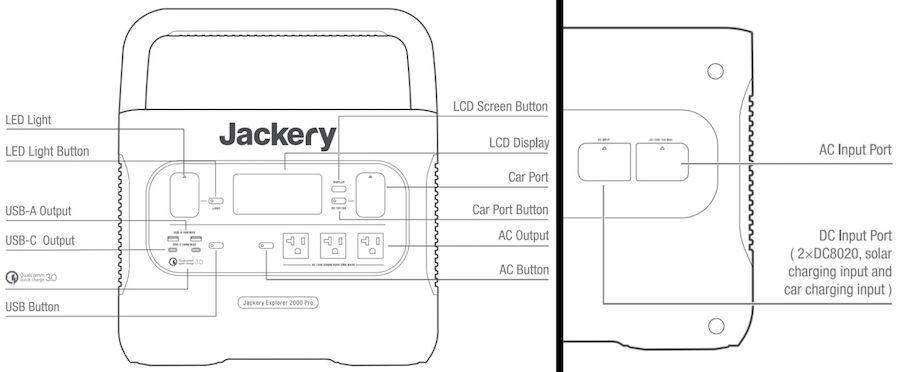
Although it’s big, the 2000 Pro is still fairly simple compared to other similar models. Its outputs are all on the front while its inputs are on its back side.
This power station is impressively lightweight. The Point Zero Energy Titan is the same size as this Jackery but it weighs 67 lbs, which is 24 lbs heavier than the Explorer 2000.
Jackery Explorer 2000 Pro: What Does It Come With?
- 1x Car charger cable
- 1x AC charger cable
- 1x User manual
- 3-year warranty
Detailed Specs – Bluetti AC200MAX & Jackery 2000 Pro
| Solar Generator | Bluetti AC200MAX | Jackery Explorer 2000 Pro |
|---|---|---|
| Image | ||
| Battery Capacity | 2,048Wh | 2160Wh |
| Dimensions | 16.5 x 11 x 15.2 in | 15.1 x 10.5 x 12.1 in |
| Output Ports | 4x AC ports: 2,200W (4,800W peak) 1x 120V/30A NEMA TT-30 1x RV port (12V, 30A) 1x DC car port (12V, 10A) 2x DC5521 ports (12V, 10A) 1x USB-C port (100W) 2x USB-A QC ports (18W) 2x USB-A ports (15W) 2x Wireless charging pads (15W) | 3x AC ports: 2200W (4,400W Peak) 1x DC car port (12V, 10A) 2x USB-C ports (100W) 2x USB-A QC ports (18W) |
| Charge Times* | AC Wall Charging Standard (400W): 5.5-6 hrs Solar Charging @ max input (900W): 3 hrs Car Charging @ 12V (100W): 20 hrs @ 24V (200W): 10 hrs Combined Charging AC + solar (1,300W): 2-2.5 hrs Dual AC (800W): 3-3.5 hrs | AC Wall Charging Standard (1,800W): 2 hrs Solar Charging @ max input (1,400W): 2.5-3 hrs Car Charging @ 12V (100-120W): 24 hrs |
| Weight | 61.9 lbs | 43 lbs |
| Cycle Life | 3,500 cycles to 80% capacity | 1,000 cycles to 80% capacity |
| Warranty | 24 months | 3 years |
| Price | $1,999 (Shop Solar Kits) | $2,299 (Amazon) |
| User Manual | AC200MAX manual | Explorer 2000 Pro manual |
*Charge Times: The listed solar input and recharging time is based on the maximum solar input - not the solar panel rated power output (Ex: a 100W solar panel usually produces about 80W of actual power in good sunlight).
- Output Ports: The Bluetti model has 16 total outputs, whereas the Jackery only has eight. Their AC inverters deliver similar amounts of power, but the AC200MAX has a NEMA TT-30 output which is uncommon even for large solar generators.
- Charging Times: The Explorer 2000 actually charges faster than the Bluetti with 2.5x faster wall charging and slightly faster solar charging. If you want to charge the Bluetti faster, you can combine solar and AC methods for about a 2.5-hour charge time.
- Weight: Although the Explorer 2000 has a slightly higher battery capacity, it is 20 pounds lighter than the Bluetti competitor. Although both systems are over 40 lbs, this difference is worth noting depending on how mobile you intend to be with your generator.
- Cycle Life: The Jackery model’s battery is rated at 1,000 cycles, which is twice the life of the previous models discussed. However, the AC200MAX has 3,500 cycles. Once again, the Bluetti power station lasts longer than the Jackery counterpart.
What Can They Power?
| Power Station/Appliance | Bluetti AC200MAX | Jackery Explorer 2000 Pro |
|---|---|---|
| Laptop (80Wh) | 19-23 charges | 20-24 charges |
| LCD TV (150W) | 10.4 hours | 10.8 hours |
| Desktop Computer (200W) | 7.83 hours | 8.1 hours |
| Microwave Oven (1100W) | 1.42 hours | 1.47 hours |
| Blender (250W) | 6.27 hours | 6.48 hours |
| Toaster (650W) | 2.41 hours | 2.49 hours |
| Hair Dryer (1,600W) | 58 minutes | 61 minutes |
Which Is Better Overall?
Overall, the Bluetti is better because you can simply power more devices/appliances with it. Plus, its ability to expand its battery size makes it capable of powering what you need for longer.
Lastly, as with all of the Bluetti systems discussed today, it lasts 3.5x longer than the Jackery 2000. With the prices of these larger solar generators, battery cycle life is key and should be a major factor when considering one for an off-grid system.
| Power Station/Specs | Bluetti AC200MAX | Jackery Explorer 2000 Pro |
|---|---|---|
| Higher Battery Cycle Life | X | |
| More Port Options | X | |
| Higher Solar Input | X | |
| Faster AC Charging | X | |
| Lighter Weight | X | |
| Cheaper Cost | X |
You can find the AC200MAX and compare pricing options via the affiliate links below:
Conclusion – Which Company Is Right for You?
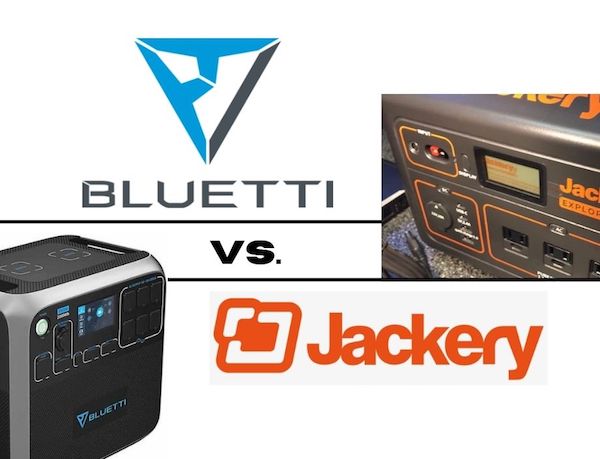
Jackery has the advantage when it comes to weight and simplicity, but Bluetti has it for nearly every other measurable category.
Of course, certain portable power stations may have better specs than others, but it also depends on which specs matter to you the most.
I would choose Bluetti because of its performance, value, and versatility in outputs, but you may need a lightweight system or one that doesn’t have all of the extra features.
If you like these comparisons, you may want to check out how these companies compare to other brands. Below, I have some more of my in-depth comparisons that you can gain some insights from:





